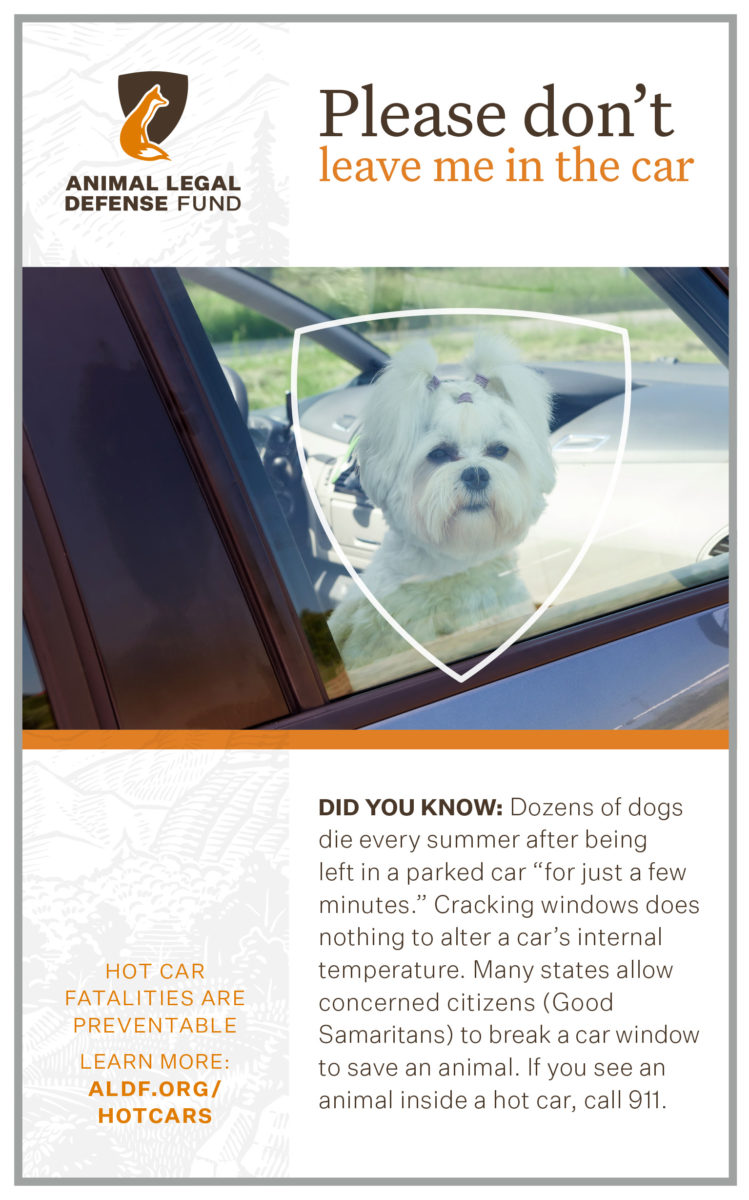
An Avoidable Tragedy: Dogs in Hot Cars
Legislation That Can Help Save Lives
Every summer, as temperatures rise, so does the danger of companion animals dying because they are carelessly left in a hot car. While humans cool themselves by relying on an extensive system of sweat glands and evaporation, dogs and other animals have a harder time staying cool, leaving them extremely vulnerable to heatstroke.
Parked cars quickly trap the sun’s heat. Even on a day when it’s 70 degrees outside, the temperature inside a car with all the windows closed can hit 89 degrees in just 10 minutes, according to the American Veterinary Medical Association.
On a hot day, the temperature inside a closed car can shoot as high as 114 degrees in the same amount of time. Leaving the windows open a crack doesn’t eliminate the danger of heatstroke or death.
What You Can Do
Know the Law
Discover which state laws and city/county ordinances in your jurisdiction address leaving animals unattended in vehicles. The issue may be addressed specifically or by way of general abuse/neglect statutes.
Strengthen Your Laws
Approach your legislators about addressing the “hot car” problem and enabling emergency rescues.
Connect Your Local Law Enforcement Agencies with Animal Legal Defense Fund Resources
Let your local authorities know that the Animal Legal Defense Fund’s Criminal Justice Program attorneys offer training and resources to law enforcement agents on this and other animal law issues.
Spread the Word

- Download and print our flyer, and hang in grocery stores, cafes, laundromats, and other locations where people may leave dogs in hot cars. Many businesses will be happy to hang a flyer in their front window if you ask politely. And share the flyer with your local humane agencies to help them make the public aware of these laws.
- Download this image for Twitter, Facebook, or Instagram to share on your social networking profiles.
Overview of State Laws
Over half of the states have “hot car” laws (laws that either prohibit leaving unattended animals in vehicles, or that allow certain people to rescue animals left unattended in vehicles).
As of 2025, 32 states plus the District of Columbia and Guam currently have some form of a “hot car” law on the books. There are three different types of “Hot Car” laws, and many states have more than one type.

Note: This page provides a general overview of the status of these laws across the country. The law is always changing, so always consult an official source for the current and complete version of the statute. The notes provided, which highlight features and exemptions of the laws, are abbreviated and may not reflect the full content or context of the law.
Type 1: Restrictions on leaving animals unattended in a vehicle.
These laws typically do not prohibit confinement at specific temperatures for a specific amount of time. Rather, the provisions tend to prohibit a broad range of conduct, e.g. confining an animal in a manner that endangers their health or safety. 19 states plus D.C. and Guam that have these restrictions:
1. Arizona – Ariz. Rev. Stat. § 13-2910
2. California – Cal. Penal Code § 597.7 (has an exemption for livestock)
3. Colorado – Colo. Rev. Stat. § 18-9-202
4. Delaware – Del. Code Ann. tit. 11, § 1325 (exempts livestock for transport)
5. District of Columbia – D.C. Code § 8-1808.02
6. Guam – 9 G.C.A. § 70.60
7. Illinois – 510 Ill. Comp. Stat 70/7.1
8. Maine – Me. Rev. Stat. tit. 17, § 1031
9. Maryland – MD Code, Transportation, § 21-1004.1 (limited to cats and dogs)
10. Massachusetts – Mass. Gen. Laws ch. 140, § 174F
11. Minnesota – Minn. Stat. § 346.57 (limited to cats and dogs)
12. Nevada – Nev. Rev. Stat. § 202.487 (limited to pets)
13. New Hampshire – N.H. Rev. Stat. § 644:8-aa (limited to domestic animals, household pets, or wild animals in captivity)
14. New Jersey – N.J. Stat. Ann. § 4:22-17, N.J. Stat. Ann. § 4:22-26
15. New York – N.Y. Agri & Mkts Law § 353-d
16. North Dakota – N.D. Cent. Code § 36-21.2-12
17. Rhode Island – R.I. Gen. Laws § 4-1-3.2
18. South Dakota – S.D. Codified Laws § 40-1-36 (limited to dogs, cats, and other small animals)
19. Vermont – Vt. Stat. tit. 13, § 386
20. Washington – Wash. Rev. Code § 16.52.340 (limited to companion animals)
21. West Virginia – W. VA. CODE § 61-8-19
Type 2: Laws allowing public officials to rescue animals from vehicles.
Typically these laws permit certain public officials (such as police officers, animal control, humane officers, and first responders) to break into an unattended vehicle to rescue an animal if certain conditions are met, including having a good-faith, reasonable belief that the animal is in imminent danger.
These laws usually give public officials civil immunity for their actions, meaning that the vehicle’s owner cannot sue for damages. 21 states and D.C. have these laws:
1. Arizona – ARIZ. REV. STAT. § 13-2910
2. California – CAL. PENAL CODE § 597.7
3. Delaware – DEL. CODE ANN. tit. 11, § 1325
4. District of Columbia – D.C. CODE ANN. § 8-1808.02
5. Georgia – Ga. Code Ann., § 35-1-7 (limited to pets)
6. Guam – 9 G.C.A. § 70.60
7. Illinois – 510 ILL. COMP. STAT 70/7.1
8. Indiana – IND. CODE 34-30-30-03 (limited to domestic animals, and exempts livestock)
9. Maine – Maine Rev. Stat. ch. 7 § 4019
10. Maryland – MD Code, Transportation, § 21-1004.1 (limited to cats and dogs)
11. Massachusetts – MASS. GEN. LAWS ch. 140, § 174F
12. Minnesota – MINN. STAT. § 346.57 (limited to cats and dogs)
13. Nevada – NEV. REV. STAT. § 202.487 (limited to pets)
14. New Hampshire – N.H. REV. STAT. ANN. § 644:8-aa (limited to domestic animals, household pets, or wild animals in captivity)
15. New Jersey – N.J. Stat. Ann. § 4:22-17.7 (not specific to animals in vehicles, but permits certain officials to enter private property and seize animals who are in imminent danger)
16. New York – N.Y. Agri & Mkts Law § 353-d
17. North Carolina – NC ST § 14-363.3 (exempts horses, cattle, swine, poultry, and livestock)
18. North Dakota – N.D. CENT. CODE § 36-21.2-12
19. Oregon – ORE. REV. STAT. § 167.345
20. Rhode Island – R.I. GEN. LAWS § 4-1-3.2
21. Pennsylvania – 42 Pa. Cons. Stat. Ann. § 8340.3 (limited to dogs and cats)
22. South Dakota – S.D. CODIFIED LAWS § 40-1-36 (limited to dogs, cats, and other small animals)
23. Vermont – VT. STAT. tit. 13, § 386
24. Virginia – Va. Code Ann. § 3.2-6504.1 (limited to companion animals)
25. Washington – WASH. REV. CODE § 16.52.340 (limited to companion animals)
Note: 8 other states (Colorado, Connecticut, Florida, Kansas, Louisiana, Ohio, Tennessee, and Wisconsin) have “Good Samaritan laws which are discussed in further detail below. Those laws permit any person to rescue an unattended animal in certain circumstances, and would therefore also allow law enforcement to rescue an animal as well.
Type 3: “Good Samaritan” laws.
These laws allow private civilians—under select circumstances—to rescue an animal that has been left unattended in a motor vehicle. Most of these laws only permit the rescue of “domestic” animals—and each state defines that term differently.
Each state has specific requirements which usually include: (1) having a good-faith, reasonable belief the animal’s health or life is at imminent risk; (2) contacting law enforcement before attempting to enter the vehicle; (3) using no more force than is necessary; and (4) remaining with the animal in a safe location until law enforcement arrives.
Most of these “Good Samaritan” laws only provide civil immunity, but not criminal immunity. Civil immunity prevents the vehicle or animal’s owner from suing to recover the costs of damages. However, unless the law provides criminal immunity, rescuers could still be prosecuted for property damage, trespass, or any other applicable crimes. Therefore it is always best to contact law enforcement before taking any action.
14 states have “Good Samaritan” laws:
1. Arizona – Ariz. Rev. Stat. § 12-558.02 (limited to domestic animals; civil immunity only)
2. California – CAL. PENAL CODE § 597.7 (criminal immunity) and Cal. Civil Code § 43.100 (civil immunity)
3. Colorado – CO. REV. STAT. 13-21-108.4 (limited to dogs and cats; both civil and criminal immunity)
4. Connecticut – Conn. Stat. § 52-557u (both civil and criminal immunity)
5. Florida – FL. STAT. § 768.139 (limited to domestic animals; civil immunity only)
6. Indiana – IND. CODE 34-30-30-03 (limited to domestic animals, exempts livestock; both civil and criminal immunity; but the rescuer is liable for one-half of the cost of repairing the damage to the motor vehicle)
7. Kansas – Kan. Stat. § 60-5401 (limited to domestic animals; civil immunity only)
8. Louisiana – LA. REV. STAT. § 37:1738.1 (limited to dogs and cats kept for pleasure, companionship, or other non-commercial purpose; immunity for property damage and trespass)
9. Massachusetts – MASS. GEN. LAWS ch. 140, § 174F (both civil and criminal immunity)
10. Ohio – OHIO REV. CODE § 959.133 (civil immunity only)
11. Oregon – Or. Rev. Stat. § 30.813 (limited to domestic animals; both criminal and civil immunity)
12. Tennessee – TENN. CODE § 29-34-209 (civil immunity only)
13. Vermont – VT. STAT. tit. 12 § 5784 (civil immunity only)
14. Wisconsin – WIS. STAT. § 895.484 (limited to domestic animals kept as pets, excludes farm animals; civil immunity only)
Washington recently passed a “good Samaritan” law, which will go into effect July 27, 2025 – Wash. Rev. Code § 4.24.0002 (limited to domestic animals kept as pets, excludes farm animals; civil immunity only).
